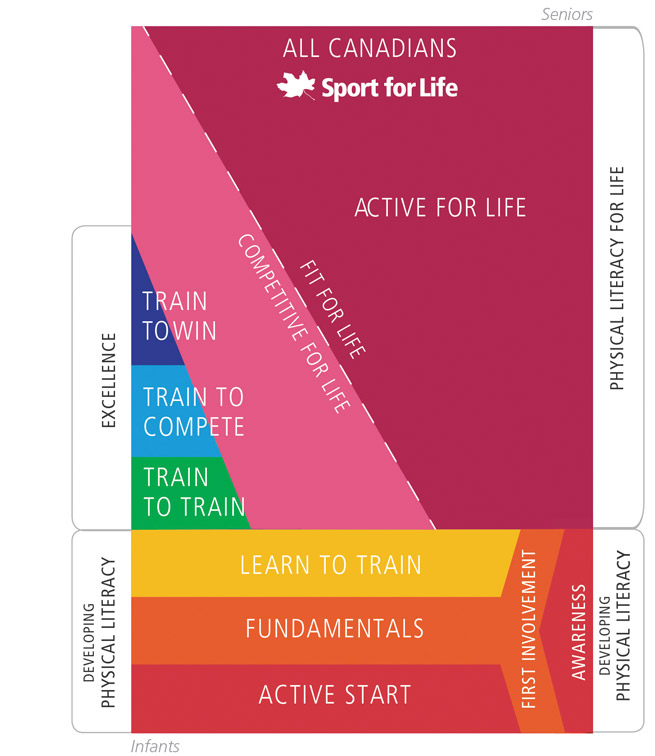A clear path to better sport, greater health, and higher achievement
Children, youth and adults need to do the right things at the right time to develop in their sport or activity – whether they want to be hockey players, dancers, figure skaters or gymnasts. LTAD describes the things athletes need to be doing at specific ages and stages.

Active Start
From 0-6 years, boys and girls need to be engaged in daily active play. Through play and movement, they develop the fundamental movement skills and learn how to link them together. At this stage developmentally appropriate activities will help participants feel competent and comfortable participating in a variety of fun and challenging activities and games.
Awareness
Awareness promotes an understanding of opportunities to get involved in sport and physical activity. It highlights opportunities for persons of all abilities to participate in sport, become an athlete, and go as far as their ability and motivation will take them. In Awareness, prospective participants and leaders are informed of the range of activities available and how they can take part.
First Involvement
First involvement refers to the first experiences participants have in sport. In this phase it is critical to ensure individuals have a positive first experience in an activity as negative first experiences can lead to non-participation. Organizations and leaders need to create a safe, welcoming and inclusive environment for participants with developmentally appropriate instruction, adapted equipment and facilities with a program orientation they will nurture the desire and confidence to participate for life. Clear direction should be provided to participants with regarding their second involvement.
FUNdamentals
In the FUNdamentals stage, participants develop fundamental movement skills in structured and unstructured environments for play. The focus is on providing fun, inclusive, multisport, and developmentally appropriate sport and physical activity. These experiences will result in the participant developing a wide range of movement skill along with the confidence and desire to participate.
Learn to Train
Once a wide range of fundamental movement skills have been acquired, participants progress into the Learn to Train stage leading to understanding basic rules, tactics and strategy in games and refinement of sport specific skills. There are opportunities to participate in multiple sports with competitions focused on skill development and retention. Games and activities are inclusive, fun and skill based. At the end of the Learn to Train stage, participants grow (or progress) towards sport excellence in the Train to Train stage or being Active for Life, either by being Competitive for Life or Fit for Life.
Train to Train
Athletes enter the Train to Train stage when they have developed proficiency in the athlete development performance components (physical, technical-tactical, mental, and emotional). Rapid physical growth, the development of sporting capability and commitment occurs in this stage. Athletes will generally specialize in one sport towards the end of the stage. A progression from local to provincial competition occurs over the course of the stage.
Train to Compete
Athletes enter the Train to Compete stage when they are proficient in sport-specific Train to Train athlete development components (physical, technical-tactical, mental, and emotional). Athletes are training nearly full-time and competing at the national level while being introduced to international competition.
Train to Win
Athletes in the Train to Win stage are world class competitors who are competing at the highest level of competition in the world (e.g. Olympics, Paralympics, World Championships, World Cups or top professional leagues). These athletes have highly personalized training and competition plans and have an Integrated Support Team of physical therapists, athletic therapists, and sport psychologists providing ongoing support.
Active for Life
Individuals who have a desire to be physically active are in the Active for Life stage. A participant may choose to be Competitive for Life or Fit for Life and, if inclined, give back as a sport or physical activity leader. Competitive for Life includes those who compete in any organized sport recreation leagues to Master Games. Fit for Life includes active people who participate in non-competitive physical activity.
For more information on LTAD: